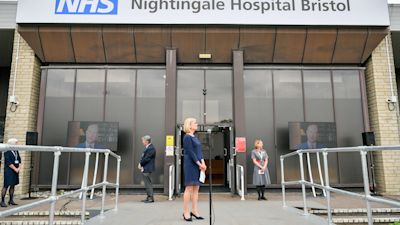New Nightingale 'surge hub' facility planned for Bristol as Omicron cases rise

A new Nightingale facility will open in North Bristol as the NHS prepares for a potential wave of covid admissions.
The surge hub will be able to house 100 patients and work to build eight of them across the country could start as early as this week.
The plans for the temporary structures come as the NHS battles with record numbers of covid cases and a sharp increase in Omicron infections.
The hubs will be placed in hospital grounds and it's hoped they will make it easier to flex staff and equipment if there is a surge in admissions, providing access to diagnostics and emergency care if required.
The national medical director of the NHS, Professor Stephen Powis, said: "Given the high level of COVID-19 infections and increasing hospital admissions, the NHS is now on a war footing.
"We do not yet know exactly how many of those who catch the virus will need hospital treatment, but given the number of infections we cannot wait to find out before we act and so work is beginning from today to ensure these facilities are in place.
"We hoped never to have to use the original Nightingales and I hope we never to have to use these new hubs.
"Staff across the health service are working around the clock to provide the best possible care to patients and rollout the NHS Covid vaccination programme.
"The public can play their part by following the guidance to limit the spread of infection and by getting boosted now.
"The science is clear. Two doses of vaccine do not provide enough protection against Omicron so if you have not yet had a life-saving booster do not delay any longer."
NHS staff have been working over Christmas on the plans to create 4,000 "super surge" beds across the health service - by comparison, a large district hospital might typically have around 500 beds.
The new Nightingale facilities will take patients who need minimal support and monitoring while they recover from illness.
Patients may include those recovering from COVID-19 who are no longer infectious and do not need intensive oxygen therapy.
The Secretary of State for Health and Social Care, Sajid Javid, said: "We’ve backed the NHS at every turn throughout this pandemic to make sure it provides the care and treatment people need.
"I want to thank the tireless efforts of our health workers on the frontline who are delivering for patients every day.
"We hope the Nightingale surge hubs at hospitals will not have to be used but it is absolutely right that we prepare for all scenarios and increase capacity."
Clinical and non-clinical staff are expected to be brought in with rapid training to be able to perform routine checks and other tasks.
Local leaders have also been told to consider using hotels and care hubs in care homes to provide places for people to recover before going home, rather than in hospital wards.
The use of virtual wards, where patients get monitoring technology and regular check-ins from clinicians to allow them to return home earlier safely are also being ramped up by hospital teams.